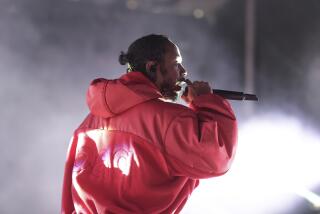It’s Still a Party, but Hip-Hop Is Testing Political Waters
NEW YORK — Outside City Hall, around the sidewalk stage, things get crazy early on. Kids cram the streets, tens of thousands crowding every inch of pavement for blocks. Onstage, there is Big Tigger, from BET’s “Tha Bassment,” pleading, “Please do not push. You’ve got to take a baby step back. Please help us help y’all.” Not that the pleading does any good.
There are gaggles of girls, drunk on heat and hormones and the prospect of seeing a favorite rap star: Jay-Z. P. Diddy. LL Cool J. Common. Noreaga. RZA from Wu-Tang Clan. So they shove and push, and heave and squeeze, until the barricades come crashing down.
Sure, they’re here to protest school budget cuts, but on this first Tuesday in June, at least, the vibe is more rap concert than City Hall demonstration.
Big Cap is on the turntable. Tigger’s on the mike. A hundred or so of New York’s finest are on alert. Jumbotrons dot the street. “Backstage”--a squared-off cordon of concrete--hip-hop’s hottest, from Rah Digga to Foxy Brown, to Chuck D and Erykah Badu, to Rev. Run and Raekwon, are snaking through the crush of fans, teachers, City Council members, union reps, activists and wannabes hell-bent on snaring a record deal. They’re here, as Noreaga puts it, “to support the cause.” And because rap mogul Russell Simmons of Def Jam Records, the rally organizer, asked them to be here.
This is what hip-hop, approaching its 30th year, looks like as it comes of age politically. Flush with cash and the power of rap’s international appeal to young people, some in the hip-hop community are starting to imagine the possibilities inherent in lassoing the energy of millions of record-buying fans.
Of course, activism and hip-hop have always danced together. They’ve been partners ever since rap’s earliest beginnings in the Bronx, when Afrika Bambaataa and his Universal Zulu Nation abandoned gangbanging for rapping and grass-roots organizing in the 1970s. But Simmons’ rally in Manhattan reflects a ratcheting-up of an investment in the three Ps: politics, philanthropy and protest. It’s even got a nickname: raptivism.
On the electoral front, spoken-word artist and school administrator Ras Baraka just completed his third run for office in Newark, N.J.; City Council contender George Martinez, a.k.a. Rithm, says he’s the first MC to run for elected office in New York; and self-proclaimed “hip-hop minister” Conrad Muhammad, formerly of the Nation of Islam, is mulling over challenging Rep. Charles Rangel (D-N.Y.)--on the Republican ticket.
On the philanthropy side, there’s Simmons, whose newly formed Hip-Hop Summit Action Network funds literacy programs, arts education and political candidates. And then there are Mos Def and Talib Kweli, outspoken artist-activists who organized other rappers to produce “Hip-Hop for Respect,” a maxi-single decrying police brutality; proceeds benefited a nonprofit organization that encourages entertainers to play leadership roles.
P. Diddy founded Daddy’s House, a charity that provides money to underprivileged children in Harlem for computer camps and trips to Africa. In Los Angeles last month, Boots Riley of the Coup, Blackilicious, Dilated Peoples, Mystic, spoken-word artist Saul Williams and Ozomatli performed for free in “Not in Our Name,” the first large-scale benefit concert to protest the Bush administration’s war on terrorism.
Not the hip-hop you usually see on your TV screen. Where’s the music that embraces the glamorous life, the live-now-I-got-mine attitude found in countless hits, and in flashy videos where hoochie-mamas bounce their backsides and Busta Rhymes exhorts, “Pass the Courvoisier”? Therein are the two faces of hip-hop. While Busta extols a brand of cognac, Nas is declining a lucrative deal with Coors beer because he says he doesn’t want to peddle alcohol to African Americans. The “conscious” side of hip-hop is what prompted Public Enemy frontman Chuck D to dub rap the “CNN of the ghetto” in the late ‘80s, the side where political, social and cultural issues are hashed out in verse.
Some see it as a war for the soul of hip-hop.
Next month, the Hip-Hop Summit Action Network will launch a literacy program as part of a joint effort with Def Jam Records and the Urban League. The group will also work with the NAACP to relaunch Rap the Vote. Mary J. Blige, P. Diddy and LL Cool J have already taped public service announcements encouraging young people to register to vote.
Simmons describes himself as “very, very committed. We did the Hip-Hop Summit and made a lot of promises, we are mentoring kids, we do have a think tank, we do have a Def Jam literacy program, and it’s not easy.”
“We are committed to forming an alliance with those organizations that young people felt connected with.... People have been disconnected from the civil rights movement and we’re working really hard to connect those dots.”
As others already know and Simmons seems to be learning, connecting the dots isn’t an easy task. Though there were probably historic alliances outside City Hall that day--hip-hop and organized labor--not even all the troops seemed clear about the mission.
Just before the rally, Jay-Z took to the airwaves, urging kids to participate. But when asked what role he saw entertainers like himself playing in politics, he shrugged and threw up his hands.
“I’m just Jay-Z,” he drawled.
Does that mean he doesn’t think rappers should play politics?
“I didn’t say that,” he sputtered. “Don’t start something.”
Right now, raptivism may be more the promise of something new rather than its fulfillment.
More to Read
The biggest entertainment stories
Get our big stories about Hollywood, film, television, music, arts, culture and more right in your inbox as soon as they publish.
You may occasionally receive promotional content from the Los Angeles Times.










